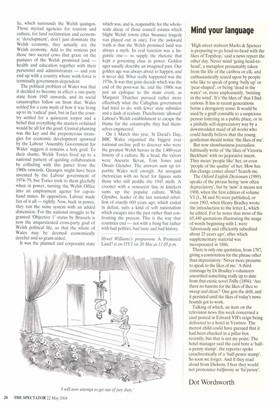Mind your language
'High street stalwart Marks & Spencer is preparing to go head-to-head with the likes of Topshop,' said a news report the other day. Never mind 'going head-tohead', a metaphor presumably taken from the life of the caribou or elk, and enthusiastically seized upon by people who like to speak of going 'belly up' or 'pear-shaped', or being `dead in the water' or, more unpleasantly, `twisting in the wind'. It's `the likes of' that I find curious. It has in recent generations borne a derogatory sense. It would be used by a gruff constable to a suspicious person loitering in a public place, or in a pitifully self-depreciatory way by a downtrodden maid of all works who could hardly believe that the young gentleman should notice `the likes of me'.
But now showbusiness journalists habitually write of `the likes of Victoria Beckham' with no pejorative intent. They mean 'people like' her, or even 'people of the quality' of her. How has this change comes about? Search me.
The Oxford English Dictionary (1989) speaks of the phrase being 'now often depreciatory', but by 'now' it means not 1908, when the first edition of volume VI (L, M and N) were published, or even 1903, when Henry Bradley wrote the introduction to the letter L, which he edited. For he notes that most of the 65,440 quotations illustrating the usage of words beginning with L were `laboriously and efficiently subedited about 25 years ago', after which supplementary material was incorporated in 1886.
There is only one quotation, from 1787, giving a connotation for the phrase other than depreciatory: 'Never more presume to speak to the likes of me.' A third rummage by Dr Bradley's volunteers unearthed something really up to date from that exotic novel Trilby (1894): 'Are there no harems for the likes of thee to sweep and clean?' One gets the drift, and it persisted until the likes of today's news hounds got to work.
Talking of which, an item on the television news this week concerned a card posted in Edward VII's reign being delivered to a hotel in Ventnor. The merest child could have guessed that it had been chucked in a pillar-box recently, but that is not my point. The hotel manager said the card bore a `halfa-penny stamp', the reporter spoke catachrestically of a 'half-pence stamp'. So soon we forget. And if they read aloud from Dickens, I fear they would not pronounce halfpenny as 'ha'penny'.
Dot Wordsworth


















































































 Previous page
Previous page